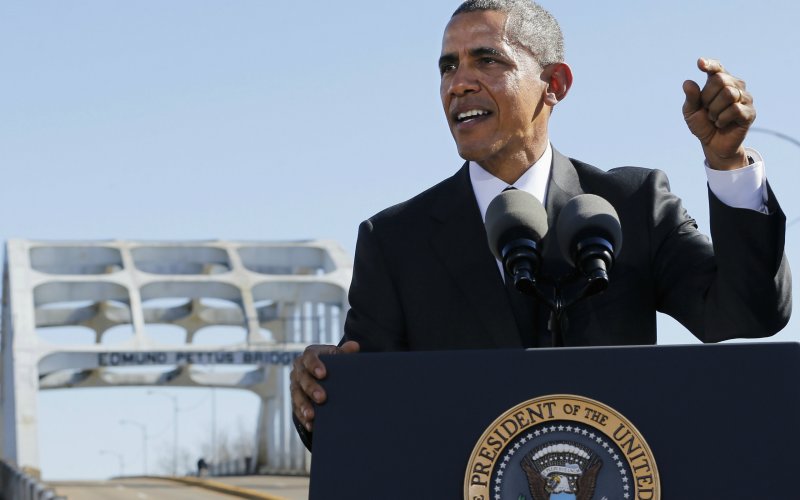
By Herb Boyd
(Special to the IBW)
As President Obama prepared to lead marchers across the Edmund Pettus Bridge spanning the Alabama River in Selma to commemorate the 50th anniversary of that historic march for voting rights on Saturday, he said that we as a nation have many “more bridges to cross.” Not only bridges to cross but marches too like the one over the weekend in Madison, Wisconsin following the police shooting death of an unarmed Black teenager by a White officer.
The president said he rejected the notion that nothing’s changed in the country since the historic march. “What happened in Ferguson may not be unique,” he said, “but it’s no longer endemic, or sanctioned by law and custom; and before the civil rights movement, it most surely was.”
Such actions of police misconduct may not be sanctioned or as blatant as in the past, but they are no less deadly and we need look no further than the homeless man shot and killed by a police officer in Los Angeles last Sunday.
Obama, in reference to the Department of Justice’s report on Ferguson and the pattern of discrimination by the police against African American citizens, said “the report’s narrative was woefully familiar,” and that familiarity will be underscored after he is back in the White House hearing again about another Black victim of excessive force by the police.
It was tragically ironic to hear the president refer to America as “a beacon of opportunity” for the youth of the world, while day after day young Black men are imperiled by police misconduct. “Young people behind the Iron Curtain would see Selma and eventually tear down a wall,” he said. “Young people in Soweto would hear Bobby Kennedy talk about ripples of hope and eventually banish the scourge of apartheid.
“Young people in Burma went to prison rather than submit to military rule,” he continued. “From the streets of Tunis to the Maidan in Ukraine, this generation of young people could change the world’s greatest superpower, and push their leaders to expand the boundaries of freedom.”
But, sadly, the boundaries of freedom for the world’s youth, has not reached Staten Island, Ferguson, Madison, and the streets of Los Angeles.
Yes, Obama is right, many things have changed, but too many of them remain the same, and Black America faces some of the same old demons, only now not as obvious though no less lethal and unsettling as last year’s Supreme Court decision that cut the heart out of the Voting Rights Act, something the president touched on without full exposition.
If he wanted to see how things have not changed all he had to do was take a look around Selma and see the many unoccupied storefronts and the fact that the Selma Country Club is a lily white now as it was when Joe Smitherman was the mayor.
And when he evoked the terrible past: “We gather here to honor the courage of ordinary Americans willing to endure billy-clubs and the chastening rod; tear gas and the trampling hoof; men and women who despite the gush of blood and splintered bone…” the distant past had a scent of currency with the recent “clash of wills” in Ferguson and other parts of a nation where the discord was jangling.
How this speech will rank with other Obama oratory will be taken on by tomorrow’s pundits, and it certainly had its share of literary references with Walt Whitman, James Baldwin, and Langston Hughes conjured.
But despite the moments of pure lyricism there was the recurring metaphor of the bridges we have to traverse in order to bring about the post-racial society that Rep. John Lewis alluded to. A few of the bridges we have to cross span the chasm between minority communities and the law enforcement agencies; the seemingly boundless gap between the one percent and the ninety percent when it comes to income equality; and the gulf of difference indicated by the recent polls between those who approve and disapprove of the president.
Each day seems to bring more bridges to cross, more marches of discontent, and more agony to the dispossessed.
Toward the end of his speech, Obama once more remarked on the “fierce urgency of now,” and that now–particularly when you consider the unfairness of the criminal justice system, the number of Black and Latinos mired in correctional control, and mass incarceration that is unmatched anywhere on the planet–becomes more urgent, more fierce each day.















